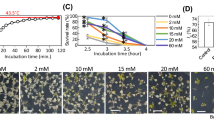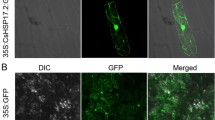Abstract
Main conclusion
Potato eukaryotic elongation factor 1A comprises multiple isoforms, some of which are heat-inducible or heat-upregulated and might be important in alleviating adverse effects of heat stress on plant productivity.
Heat stress substantially reduces crop productivity worldwide, and will become more severe due to global warming. Identification of proteins involved in heat stress response may help develop varieties for heat tolerance. Eukaryotic elongation factor 1A (eEF1A) is a cytosolic, multifunctional protein that plays a central role in the elongation phase of translation. Some of the non-canonical eEF1A activities might be important in developing plant heat-stress tolerance. In this study, we investigated effects of heat stress (HS) on eEF1A expression at the protein level in potato, a highly heat vulnerable crop. Our results from both the controlled environment and the field have shown that potato eEF1A is a heat-inducible protein of 49.2-kDa with multiple isoforms (5–8). Increase in eEF1A abundance under HS can be mainly attributed to 2–3 basic polypeptides/isoforms. A significant correlation between eEF1A abundance and the potato productivity in the field was observed in two extremely hot years 2011 and 2012. Genomic Southern blot analysis indicated the existence of multiple genes encoding eEF1A in potato. Identification, isolation and utilization of heat-inducible eEF1A genes might be helpful for the development of the heat-tolerant varieties.





Similar content being viewed by others
References
Ambrosone A, Di Giacomo M, Leone A, Grillo MS, Costa A (2013) Identification of early induced genes upon water deficit in potato cell cultures by cDNA-AFLP. J Plant Res 126(1):169–178
Axelos M, Bardet C, Liboz T, Le Van Thai A, Curie C, Lescure B (1989) The gene family encoding the Arabidopsis thaliana translation elongation factor EF-1α: molecular cloning, characterization and expression. Mol Gen Genet 219:106–112
Berberich T, Sugawara K, Harada M, Kusano T (1995) Molecular cloning, characterization and expression of an elongation factor 1α gene in maize. Plant Mol Biol 29:611–615
Bradford MM (1976) A rapid and sensitive method for the quantitation of microgram quantities of protein utilizing the principle of protein-dye binding. Anal Biochem 72:248–254
Browning KS, Humphreys J, Hobbs W, Smith GB, Ravel JM (1990) Determination of the amounts of the protein synthesis initiation and elongation factors in wheat germ. J Biol Chem 265(29):17967–17973
Bukovnik U, Fu J, Bennett M, Prasad PVV, Ristic Z (2009) Heat tolerance and expression of protein synthesis elongation factors, EF-Tu and EF-1α, in spring wheat. Funct Plant Biol 36(3):234–241
Carneiro NP, Hughes PA, Larkins BA (1999) The eEF1A gene family is differentially expressed in maize endosperm. Plant Mol Biol 41:801–813
Chang YWE, Traugh JA (1998) Insulin stimulation of phosphorylation of elongation factor 1 (eEF-1) enhances elongation activity. Eur J Biochem 251(1–2):201–207
Chuang SM, Chen L, Lambertson D, Anand M, Kinzy TG, Madura K (2005) Proteasome-mediated degradation of cotranslationally damaged proteins involves translation elongation factor 1A. Mol Cell Biol 25:403–413
Chung E, Cho CW, So HA, Yun BH, Lee JH (2009) Differential expression of soybean SLTI100 gene encoding translation elongation factor 1A by abiotic stresses. J Plant Biotechnol 36(3):255–260
Costa A, Di Giacomo M, Massarelli I, De Palma M, Leone A, Grillo MS (2010) Isolation, characterization and expression of an elongation factor 1α gene in potato (Solanum tuberosum) cell cultures. Plant Biosyst 144(3):618–625
Dharmawardhane S, Demma M, Yang F, Condeelis J (1991) Compartmentalization and actin binding properties of ABP-50: the elongation factor-1 alpha of Dictyostelium. Cell Motil Cytoskel 20(4):279–288
Dunn MA, Morris A, Jack PL, Hughes MA (1993) A low-temperature-responsive translation elongation factor lα from barley (Hordeum vulgare L.). Plant Mol Biol 23:221–225
Dutt S, Parkash J, Mehra R, Sharma N, Singh B, Raigond P et al (2015) Translation initiation in plants: roles and implications beyond protein synthesis. Biol Plant 59(3):401–412
Fu J, Ristic Z (2010) Analysis of transgenic wheat (Triticum aestivum L.) harboring a maize (Zea mays L.) gene for plastid EF-Tu: segregation pattern, expression and effects of the transgene. Plant Mol Biol 73(3):339–347
Fu J, Momčilović I, Clemente TE, Nersesian N, Trick HN, Ristic Z (2008) Heterologous expression of a plastid EF-Tu reduces protein thermal aggregation and enhances CO2 fixation in wheat (Triticum aestivum) following heat stress. Plant Mol Biol 68:277–288
Gammulla CG, Pascovici D, Atwell BJ, Haynes PA (2011) Differential proteomic response of rice (Oryza sativa) leaves exposed to high-and low-temperature stress. Proteomics 11(14):2839–2850
Gross SR, Kinzy TG (2005) Translation elongation factor 1A is essential for regulation of the actin cytoskeleton and cell morphology. Nat Struct Mol Biol 12:772–778
Infante C, Asensio E, Cañavate JP, Manchado M (2008) Molecular characterization and expression analysis of five different elongation factor 1 alpha genes in the flatfish Senegalese sole (Solea senegalensis Kaup): differential gene expression and thyroid hormones dependence during metamorphosis. BMC Mol Biol 9(1):19
Kamal AHM, Kim KH, Shin KH, Choi JS et al (2010) Abiotic stress responsive proteins of wheat grain determined using proteomics technique. Aust J Crop Sci 4(3):196–208
Kidou S, Ejiri S (1998) Isolation, characterization and mRNA expression of four cDNAs encoding translation elongation factor 1A from rice (Oryza sativa L.). Plant Mol Biol 36:137–148
Kosová K, Vítámvás P, Prášil IT (2014) Proteomics of stress responses in wheat and barley-search for potential protein markers of stress tolerance. Front Plant Sci 5:711
Kozlowski LP (2007) Isoelectric point calculator. http://isoelectric.ovh.org. Accessed 08 Oct 2015
Larkindale J, Mishkind M, Vierling E (2005) Plant responses to high temperature. In: Jenks MA, Hasegawa PM (eds) Plant abiotic stress. Blackwell Publishing, Oxford, pp 100–144
Li Z, Chen S (1998) Inducible expression of translation elongation factor 1A gene in rice seedlings in response to environmental stresses. Acta Bot Sin 41(8):800–806
McGuire AT, Mangroo D (2007) Cex1p is a novel cytoplasmic component of the Saccharomyces cerevisiae nuclear tRNA export machinery. EMBO J 26:288–300
Momčilović I, Fu J (2014) Protein synthesis elongation factors EF-Tu and eEF1A: biosynthesis, functions and application in the improvement of heat tolerance in plants. In: Bethaz C, Puma VL (eds) New research on protein synthesis. Nova Science Publishers, New York, pp 1–49
Momcilovic I, Ristic Z (2007) Expression of chloroplast protein synthesis elongation factor, EF-Tu, in two lines of maize with contrasting tolerance to heat stress during early stages of plant development. J Plant Physiol 164(1) :90–99
Momčilović I, Pantelić D, Hfidan M, Savić J, Vinterhalter D (2014) Improved procedure for detection of superoxide dismutase isoforms in potato, Solanum tuberosum L. Acta Physiol Plant 36(8):2059–2066
Murashige T, Skoog F (1962) A revised medium for rapid growth and bioassay with tobacco tissue cultures. Physiol Plantarum 15:473–497
Murray MG, Thompson WF (1980) Rapid isolation of high molecular weight plant DNA. Nucleic Acids Res 8(19):4321–4326
Norbeck J, Blomberg A (1997) Two-dimensional electrophoretic separation of yeast proteins using a non-linear wide range (pH 3–10) immobilized pH gradient in the first dimension; reproducibility and evidence for isoelectric focusing of alkaline (pI > 7) proteins. Yeast 13(16):1519–1534
Pokalsky AR, Hiatt WR, Ridge N, Rasmussen R, Houck CM, Shewmaker CK (1989) Structure and expression of an elongation factor lα in tomato. Nucleic Acids Res 17:4661–4673
Ransom-Hodgkins WD (2009) The application of expression analysis in elucidating the eukaryotic elongation factor one alpha gene family in Arabidopsis thaliana. Mol Genet Genom 281:391–405
Sasikumar AN, Perez WB, Kinzy TG (2012) The many roles of the eukaryotic elongation factor 1 complex. WIREs RNA 3:543–555
Shin D, Moon SJ, Park SR, Kim BG, Byun MO (2009) Elongation factor 1α from A. thaliana functions as molecular chaperone and confers resistance to salt stress in yeast and plants. Plant Sci 177:156–160
Struik PC (2007) Responses of the potato plant to temperature. In: Vreugdenhil D (ed) Potato biology and biotechnology: advances and perspectives. Elsevier, Oxford, Amsterdam, pp 367–393
Vijaykumar D, Ramachander TVN, Mahishi LH, Kaul R, Pyati P, Paul B, Rawal SK (2002) Molecular cloning, characterization and tissue specific expression of an elongation factor 1A gene in Saccharum officinarum L. Plant Sci 162(2):315–321
Wahid A, Gelani S, Ashraf M, Foolad MR (2007) Heat tolerance in plants: an overview. Environ Exper Bot 61(3):199–223
Xu WL, Wang XL, Wang H, Li XB (2007) Molecular characterization and expression analysis of nine cotton GhEF1A genes encoding translation elongation factor 1A. Gene 389:27–35
Yamagata A, Kristensen DB, Takeda Y, Miyamoto Y, Okada K, Inamatsu M, Yoshizato K (2002) Mapping of phosphorylated proteins on two-dimensional polyacrylamide gels using protein phosphatase. Proteomics 2(9):1267–1276
Acknowledgments
This study was funded by Ministry of Education, Science and Technological Development of the Republic of Serbia, Project Grant No. TR31049.
Author information
Authors and Affiliations
Corresponding author
Electronic supplementary material
Below is the link to the electronic supplementary material.
Rights and permissions
About this article
Cite this article
Momčilović, I., Pantelić, D., Zdravković-Korać, S. et al. Heat-induced accumulation of protein synthesis elongation factor 1A implies an important role in heat tolerance in potato. Planta 244, 671–679 (2016). https://doi.org/10.1007/s00425-016-2534-2
Received:
Accepted:
Published:
Issue Date:
DOI: https://doi.org/10.1007/s00425-016-2534-2




